With Hurricane Matthew upgraded to a Category 4 storm as it tracks closer to the U.S. coast today, Florida Gov. Rick Scott warned "this storm will kill you," making a final plea for residents living in evacuation zones to leave before the deadly storm is expected to hit the southeast state early Friday morning.
"Time's running out. Leave. There's no excuses," Scott said at a news conference this morning. "This is life and death."
Other officials have echoed Scott's urgency as the hurricane batters the Bahamas and strengthens over the warm waters of the Atlantic.
“The extreme winds of a major hurricane can do a lot of damage, and not just at the coast," Rick Knabb, director of the National Hurricane Center, told "Good Morning America" today.
"Those winds can penetrate inland and that would be more so the case the closer it gets to the coast," Knabb warned. "In addition to the wind, you have storm surge potential.
“People who have been told to evacuate, they need to get out this morning, right away, because time is running out fast. You don’t want to be caught in the storm surge which is the deadliest hazard of all."
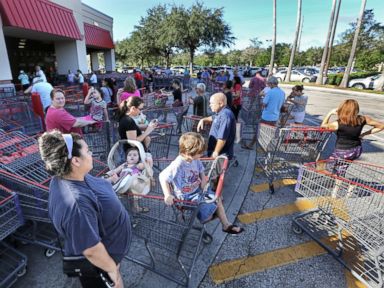
The governors of Florida, Georgia, North Carolina and South Carolina have declared states of emergency. Officials in three of those states have urged millions of people to head to safer ground as the most powerful storm to threaten the Atlantic Coast in more than a decade continued on its path northwest toward the United States at about 12 mph, packing 125 mph winds with higher gusts.
About 8 million Florida residents scrambled to make last-minute preparations as the storm was expected to strengthen from a Category 3 to a Category 4 hurricane with 145 mph winds before approaching the state tonight. The track showed Hurricane Matthew possibly making landfall just north of West Palm Beach, Florida, sometime early Friday around 2 a.m. ET.
Hurricane Matthew could be the strongest storm to hit the United States in more than a decade if it makes landfall, ABC News meteorologists said.
"It is very rare to have a hurricane of this strength to come this close or make landfall in eastern part of central or northern Florida," meteorologist Max Golembo said.
Up to 15 inches of rain may fall in some areas, and a storm surge of up to 8 feet was expected along the coast from central Florida to Georgia, according to the National Hurricane Center
The National Hurricane Center extended its hurricane warning and its hurricane watch further north into Georgia and South Carolina, respectively, at 5 a.m. ET this morning as the eye of the storm moved closer to Florida. As of 8 a.m. ET, Hurricane Matthew's center was 215 miles southeast of West Palm Beach.
"There is a danger of life-threatening inundation during the next 36 hours along the Florida east coast and Georgia coast," the National Hurricane Center said in an advisory issued this morning at 5 a.m. ET.
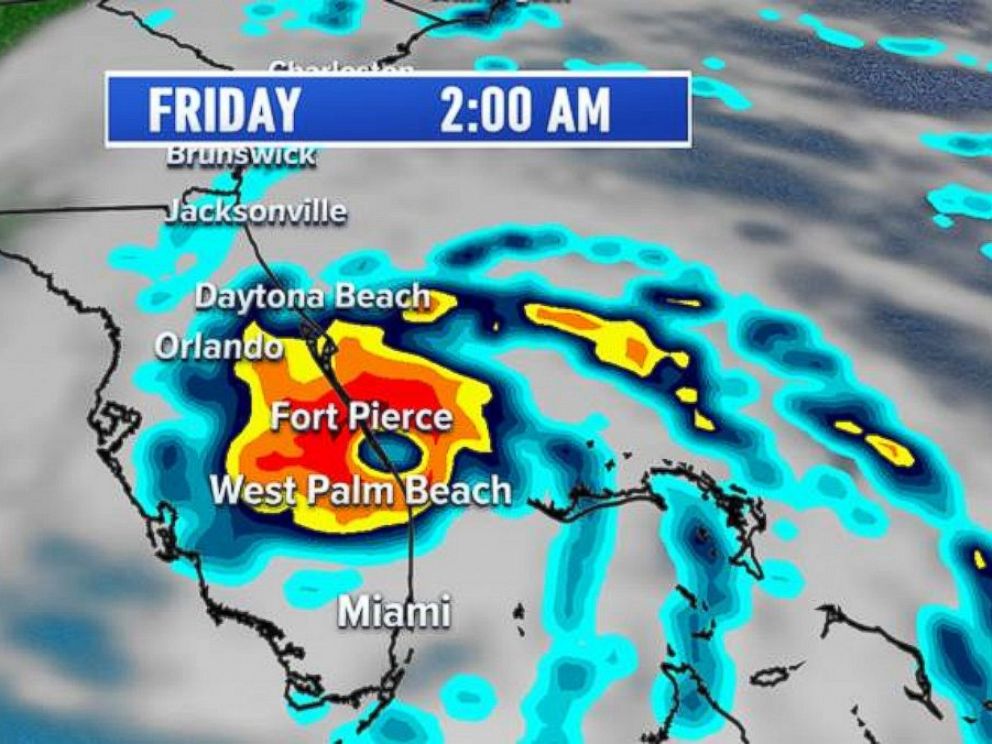
Motorists clogged highways, homeowners boarded up windows and anxious shoppers lined up at grocery stores and gas stations as they stocked up on emergency supplies in the threatened coastal areas.
"The eye has reformed, and the convection has intensified rapidly, all indicative of a storm that is going to strengthen," ABC meteorologist Daniel Manzo said.
"While the forecast looks like Matthew will bring devastating effects to the east coast of Florida, a small change in the track could have drastic changes in impact," he added. "If the storm were to track even 20 to 40 miles east of the present forecast, it would be less intense along the east coast of Florida."
After a briefing with his homeland security team at FEMA headquarters in Washington, D.C., Wednesday, President Obama told reporters Hurricane Matthew is “a serious storm, and we want everybody to take it seriously as well.”
"Just remember that you can always rebuild," Obama said. "You can always repair property. You cannot restore a life if it is lost and we want to make sure that we minimize any possible loss of life or risk to people in these areas."
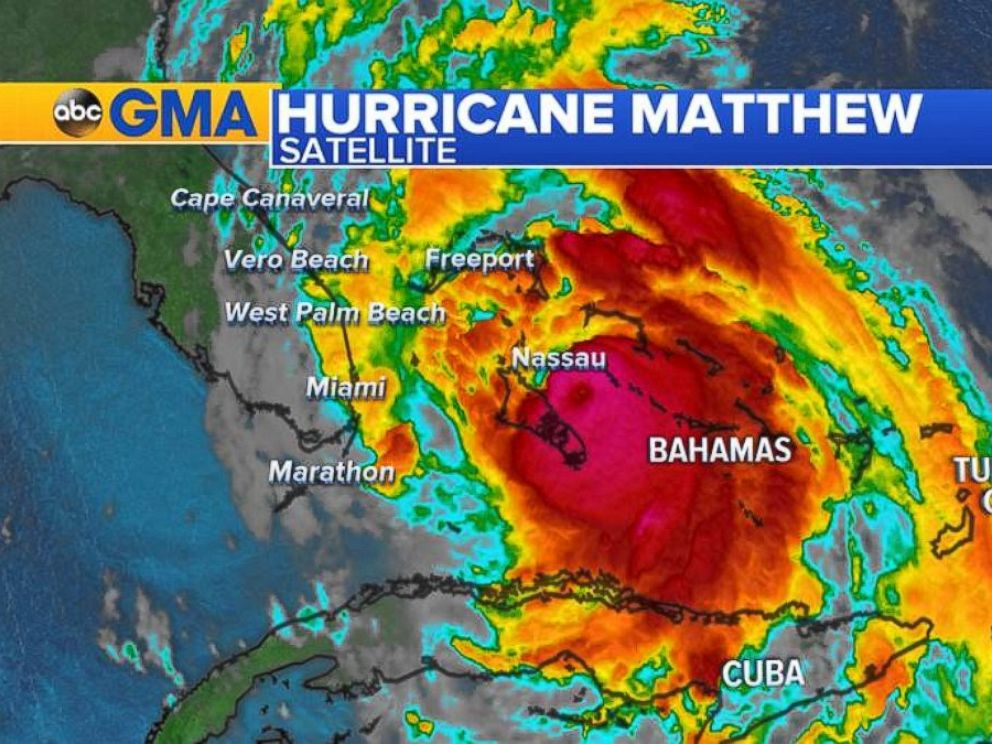
No other Atlantic storm on record has packed such powerful winds for such a prolonged period as Hurricane Matthew, which has claimed at least 16 lives after causing extensive damages in Haiti, the Dominican Republic and Cuba this week, bringing widespread torrential rain and flooding to the region.
More than 377,000 people were evacuated in Cuba, according to the United Nations. And in Haiti, at least 350,000 people are in need of immediate assistance after the hurricane's deadly impact. There were reports of a powerful storm surge, violent winds and widespread flooding.
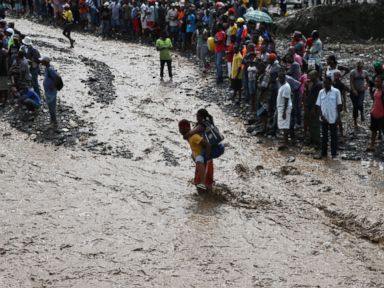
Matthew bore down on the island of New Providence in the Bahamas this morning, the country's most populous island that has not seen a major hurricane on its shores since 1929. Up to 15 inches of rain and up to 15 foot storm surges were expected from Wednesday through today in the Bahamas, which was hosting nearly 3,500 tourists.
As of 8 a.m. ET, Hurricane Matthew's center was 30 miles southwest of the Bahamas capital of Nassau, according to the National Hurricane Center.
To view this page ensure that Adobe Flash Player version 10.2.0 or greater is installed.

Close
Models released by the National Hurricane Center at 8 a.m. ET today show the storm hitting the North and South Carolina coastlines this weekend after making landfall in Florida. The storm then takes a severe turn southeast Sunday and heads back out to sea, the models show.
A swath of central and northern Florida remained under a hurricane watch today, while forecasters said nearly all of the Sunshine State can expect to see tropical storm-force winds and rain. A major hurricane has not struck Florida in over a decade.
Florida's Miami-Dade and Broward counties canceled schools for the rest of the week as the governor deployed 2,500 National Guard troops to assist in storm preparations, with another 4,000 on standby. About 1.5 million residents have been urged to evacuate, and as many as 8 million Floridians are in the storm's path.
Florida Gov. Scott warned residents to heed the advisories and move inland as he ordered state offices in 26 counties closed and suspended tolls. During a news conference this morning, Scott urged Floridians to "prepare for a direct hit," as the storm threatens heavy rain, strong rip currents, beach erosion, hurricane-force winds, storm surge up to 9 feet and the possibility of tornadoes.
Millions of residents are also expected to lose power, the governor said.
"There is no reason not to evacuate," Scott told reporters. "No excuses. Get out."
Further up the coast, Georgia Gov. Nathan Deal expanded the state of emergency Wednesday night from 13 to 30 counties in the southeastern region of the state. About 50,000 were ordered to evacuate.
Today, Deal ordered mandatory evacuations east of I-98 for six coastal counties: Bryan, Chatham, Liberty, McIntosh, Glynn and Camden.
"I also encourage the voluntary evacuation of residents in low-lying, coastal areas west of I-95,” Deal said in a prepared statement today. "I urge Georgians in the affected areas to remain calm, be prepared and make informed, responsible decisions as we continue to monitor Hurricane Matthew’s path.”
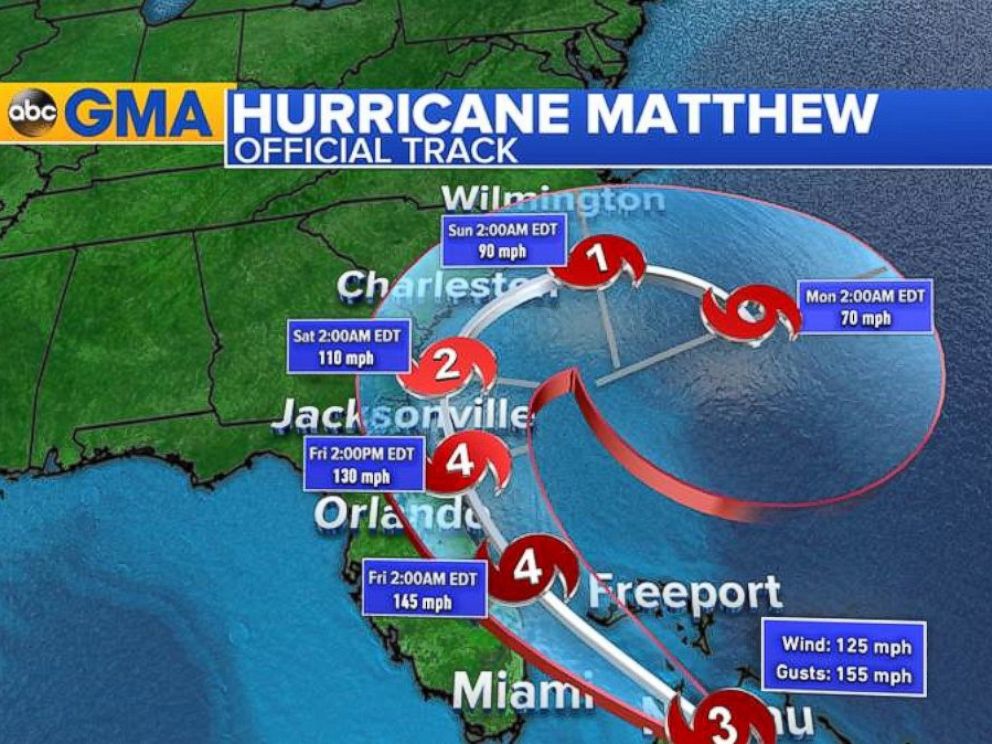
In South Carolina, Gov. Nikki Haley announced plans for additional evacuations today, bringing the total to about 500,000 people ordered to move from coastal areas.
Residents in Charleston and Beauford counties and areas of Berkeley, Colleton, Dorchester and Jasper counties were advised to begin evacuating Wednesday no later than 3 p.m. ET. The scope of the evacuation expanded to include Horry and Georgetown counties by 12 p.m. ET today.
But the state's governor said not enough people are following the advisories. As of this morning, only 175,000 people had evacuated so far.
"That's not enough," Haley said at news conference this morning. “We need more people evacuating.”
Haley urged residents to "fuel up quickly" and stock up on supplies before gas stations, pharmacies and grocery stores close. Most of the state's public schools and government officers are also shuttered for the remainder of the week.
“Residents that don’t leave today will realize that nothing is open," she said.
In North Carolina, Pat McCrory said in a prepared statement, “There is still a great deal of uncertainty in the forecast models and we remain prepared to respond if Matthew changes course again. If the storm continues on its current track, we stand by ready to provide assistance, including swift water rescue boats and air support, for our neighbors in South Carolina and Georgia as needed.”
More than 2,500 flights have been canceled between Wednesday and Friday, as of this morning, according to FlightAware.com, including more than 1,400 flights canceled today and 1,100 and counting Friday.
Meanwhile, Amtrak announced today it is temporarily suspending services in the southeast region because of the severe weather that’s affecting Florida’s east coast. No alternate transportation will be provided, the passenger railroad service said.
ABC News' Jeffrey Cook, Matt Foster, Max Golembo, Melissa Griffin, Daniel Manzo and Jason Volack contributed to this report.
Click here to view original web page at abcnews.go.com






